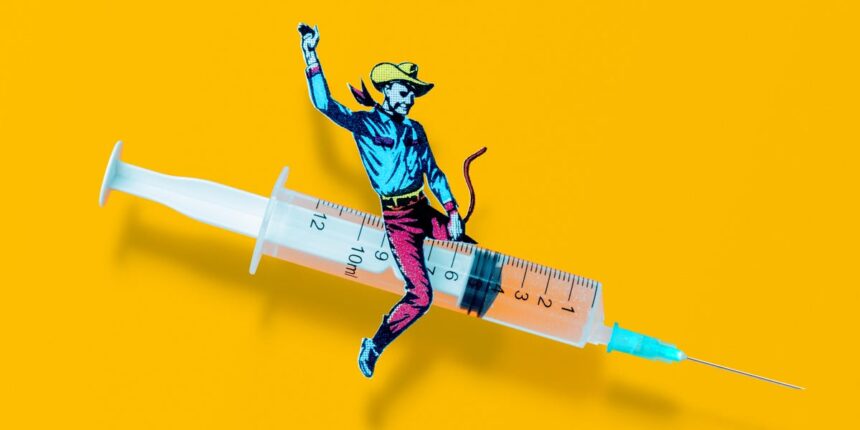“`html
Edmon De Haro for BI
Kade, at the age of 21, began his journey with testosterone injections. Although he appeared healthy externally, internally he was struggling. Feelings of anxiety and a lack of motivation plagued him to the point where driving became a challenge.
“I had extremely low energy and motivation. Getting out of bed each morning was a struggle,” Kade shared during our phone conversation from his home between Idaho and Florida.
A turning point came when his primary care physician conducted comprehensive blood tests that revealed one concerning issue: Kade’s testosterone levels were alarmingly low, ranging from 219 to 239 nanograms per deciliter. While medical professionals have varying opinions on what constitutes normal levels, it is generally accepted that men in their twenties should have levels between 400 and 600. For Kade, this diagnosis offered hope—an opportunity for improvement.
Fast forward four years; Kade has amassed an audience of 74,000 followers on TikTok where he shares how twice-weekly testosterone injections have transformed both his health and physique. Now at 25 years old, he describes himself as revitalized—healthy, muscular, lean with a full beard—and claims that his sex drive is “unleashed.”
“If you wake up in the morning and your soldier isn’t standing tall or your tent isn’t fully pitched, you likely have low testosterone,” said Kade in one video while demonstrating with a syringe. His followers often inquire about dosage details; he directs them to LaSara Medical Group—a virtual clinic specializing in men’s sexual health (LaSara confirmed that Kade receives complimentary treatments in exchange for referrals).
Kade’s experience is increasingly common among young men who are seeking testosterone replacement therapy (TRT) as they aim to enhance their physical performance.
Bryan Bedder/Athlos/Getty Images for Athlos
Once considered taboo—a private concern primarily associated with older men facing erectile dysfunction or hormonal imbalances—tracking one’s testosterone levels has evolved into an act of pride among many men today.
A notable example is Alexis Ohanian—the co-founder of Reddit and husband to Serena Williams—who recently disclosed his relatively high testosterone levels on X. He attributed this achievement to weightlifting routines along with reducing meat consumption and alcohol intake while using supplements from Ro Health—a company he’s invested in. In another instance from 2018, Joe Rogan mentioned starting TRT at age forty during one of his podcasts to enhance bodily function significantly better than before. Similarly, actor Dax Shepard revealed on his podcast in 2021 that heavy doses of testosterone injections helped him gain an impressive twenty-four pounds of muscle at age forty-six.
While general practitioners may suggest lifestyle changes such as improved diet or sleep patterns as natural methods for boosting testosterone production, there exists an expanding network of men’s clinics offering more aggressive solutions.
The number of prescriptions issued for TRT has surged dramatically across the United States over the past two decades—with reports indicating a rise by approximately twenty percent between 2016 and 2019 alone. Although recent statistics remain sparse due to inconsistent tracking methods available today suggest this upward trend continues unabated; only a minuscule fraction can be linked directly back to transgender healthcare services since only around zero-point-three percent (0.3%) identify as trans according CDC data.
The Legacy Initiated by Viagra
The intrigue surrounding testosterone dates back over one hundred years when endocrinologists first recognized its connection with male aging processes. In eighteen eighty-nine Charles-Édouard Brown-Séquard—a French physiologist known for eccentric experiments—injected himself using testicular blood along with seminal fluids derived from dogs alongside guinea pigs claiming it rejuvenated both energy levels alongside libido even at seventy-two years old!
Although modern science confirms such practices are impossible based solely upon how hormones are stored within testicles—it’s likely any perceived benefits stemmed merely from placebo effects—the concept ignited significant interest leading into new realms within hormone research fields thereafter! This resulted ultimately culminating into groundbreaking discoveries shaping contemporary transgender care yet lacking sufficient clarity justifying widespread prescriptions targeting cisgender males specifically!
Archival
The narrative surrounding today’s surge regarding specialized clinics focusing exclusively upon administering Testosterone Replacement Therapy truly began gaining traction post-2017 following Viagra losing its patent protections!
< ```Exploring the Rise of Testosterone Therapy in Men’s Health
Testosterone, often referred to as the hormone that embodies masculinity, has become a focal point in the expanding healthcare sector. Clinics now offer solutions not only for enhancing erectile function but also for addressing hair loss and overall vitality. The promise of testosterone therapy includes increased muscle mass, heightened libido, and enhanced motivation—essentially a pathway to becoming more “manly.”
A study published in Sexual Medicine revealed that between 2017 and 2019, leading direct-to-consumer (DTC) men’s health websites experienced an astonishing 1688% surge in unique visitors, averaging around five million visits monthly. The growth of DTC health services and telehealth options has continued unabated since their rapid rise during the pandemic; current statistics indicate even greater engagement today. Dr. Justin Houman, a urologist at Cedars-Sinai Medical Center in Los Angeles, noted that “this business model practically built itself,” highlighting the industry’s explosive growth.
Ro
When John Snedegar co-founded LaSara Health Clinic in 2017 focused on men’s sexual wellness, he observed a significant gap in specialized care within this field. Traditionally, urologists would only assess testosterone levels for men over 40 facing sexual or fertility issues. Fast forward seven years later; his clinic now competes with thousands of others offering targeted testosterone therapies to men across all age groups.
“Initially viewed as a treatment primarily for older men,” Snedegar explained—who transitioned from yoga instructor to entrepreneur—“we are now seeing patients as young as their twenties seeking help due to low testosterone levels.”
The Process Behind Treatment: What You Need to Know
The typical procedure begins with signing up on a clinic’s website where you answer questions regarding your energy levels, mood stability, sexual performance issues like erections or libido concerns—and possibly engage in an initial phone consultation. Some clinics like Maximus, send at-home testing kits directly to clients’ homes for assessing testosterone levels while others require blood tests conducted at affiliated labs.
Given that many clinics present testosterone replacement therapy (TRT) as an ongoing commitment—which can impact natural hormone production—their membership models often encompass comprehensive packages covering lab work and injection therapies at monthly rates ranging from $170 at LaSara Health Clinic up to $105 per month offered by Texas-based Low T Center after initial lab fees.
Gameday Men’s Health
Evan Miller from Gameday Men’s Health emphasizes community within their facility: “Patients enjoy hanging out while watching ESPN or snacking on fruit.” He adds that every individual who walks through their doors is treated like family while receiving medical support tailored towards optimal health outcomes.
Is Testosterone Therapy Effective?
The necessity for medical intervention due to low testosterone is relatively rare; it does not automatically affect all men entering middle age or beyond.
Around 20% of younger males are identified as having low testosterone—a condition known medically as hypogonadism where sex glands produce insufficient hormones—but there remains contention regarding what constitutes normal hormonal ranges among different individuals over time.
The Complexity Surrounding Symptoms
The symptoms prompting prescriptions can be vague yet widespread among various demographics; common indicators include diminished libido alongside fatigue or osteoporosis-related fractures—all conditions prevalent among men due largely varying factors including lifestyle choices such as obesity or type 2 diabetes which have been linked with lower hormone levels without clear causation established yet.
The Impact of Testosterone Replacement Therapy on Men’s Health
Testosterone levels can significantly influence various health conditions, and the relationship is often reciprocal.
I asked, ‘Are you undergoing TRT?’ They replied, ‘Yes.’ I then said, ‘That can affect your sperm count.’
Dr. Justin Dubin, Urologist in Miami, Florida
A Personal Journey: Derek’s Experience with TRT
Two years ago, Derek—a 38-year-old glazier from Southern California—was flipping through an issue of Men’s Health when he stumbled upon an article discussing testosterone replacement therapy (TRT). “Many symptoms described resonated with my own situation,” he shared while requesting anonymity for privacy reasons. Symptoms included overwhelming fatigue, erectile dysfunction, poor sleep quality, increased body fat percentage, and difficulty gaining muscle despite dietary and exercise adjustments.
After conducting online research for clinics specializing in TRT, Derek found Gameday Men’s Health. Fast forward a year and a half of weekly injections later; his enthusiasm is palpable. “I absolutely love testosterone! I would never consider stopping it,” he exclaimed during our phone conversation. Now energized enough to juggle two jobs seven days a week has transformed his life.
Dana’s Transformation Through TRT
Dana is a 45-year-old roofer and film set grip based in California who once dismissed advertisements for testosterone-boosting products as gimmicky. However, after experiencing stagnation in his fitness progress during his 40s, he decided to explore TRT as an option—reminding himself that discontinuation was always possible if it didn’t suit him. Within just four weeks of starting treatment, Dana noticed significant improvements in energy levels; even his wife remarked on the increase in his libido. A year into therapy now has him convinced about the necessity of maintaining optimal testosterone levels: “The boost in energy and libido along with physical gains at the gym are my top three benefits,” Dana stated while also choosing to keep his last name private. “It’s surprising that this isn’t discussed more widely.”
The Efficacy of TRT: Is It Right for Everyone?
While many men like Kade and Derek have experienced positive outcomes from testosterone replacement therapy (TRT), one may wonder whether it will yield similar results universally.
The Impact of Low Testosterone on Health
Low testosterone levels can significantly affect overall health and well-being. According to Dr. Houman, “When testosterone levels drop, your energy for life, enthusiasm for physical activity, and even your libido can diminish.” To combat this issue naturally, he often suggests lifestyle modifications such as increased physical activity, improved nutrition, and adequate sleep.
The Controversy Surrounding TRT in Young Men
The prescription of Testosterone Replacement Therapy (TRT) to healthy young males remains a contentious topic in the medical community. Research findings have been inconsistent; many studies are limited by small sample sizes or focus solely on older populations. This raises important questions about the effects of TRT on men under 35 years old.
Potential Benefits of TRT
There is compelling evidence that men diagnosed with hypogonadism who undergo TRT may experience increases in muscle mass and reductions in body fat—at least initially. A notable long-term study indicated that middle-aged and older men receiving TRT reported enhanced energy levels, improved sexual function, and heightened libido over a two-year period.
Recognizing the Risks Associated with TRT
However, it is crucial to acknowledge the potential side effects associated with testosterone therapy. These can include hair loss, acne outbreaks, and exacerbation of sleep apnea symptoms. Additionally, infertility is a significant concern; many urologists have encountered young patients unaware that increasing testosterone could lead to decreased sperm production.
Dr. Justin Dubin from Miami noted an increase in young men seeking fertility assistance while undergoing TRT: “I would ask them if they were on testosterone therapy; most confirmed they were unaware it could impact their sperm count.”
A Study into Direct-to-Consumer Clinics
Diving deeper into this issue sparked Dr. Dubin’s interest in conducting a secret shopper investigation involving direct-to-consumer clinics offering hormone therapies. In his 2022 study published in JAMA Internal Medicine, he posed as a 34-year-old patient interested in preserving his fertility while having above-average testosterone levels. Alarmingly, six out of seven clinics recommended testosterone treatment despite its known risks regarding fertility preservation—a revelation that highlighted significant gaps in patient education within these services.
Navigating Your Options: What You Should Know About Testosterone Therapy
If you are considering hormone therapy or suspect low testosterone levels might be affecting your quality of life or reproductive health, consult with healthcare professionals who prioritize comprehensive evaluations before initiating any treatment plan.
“`html
Innovative Approaches to Gender-Affirming Care
Men’s health clinics often navigate a complex landscape within the medical field. Unlike traditional primary care providers who adopt a comprehensive view of health, these establishments primarily function as businesses offering supplements aimed at enhancing one’s masculinity in line with societal expectations.
I am passionate about helping men build a supportive community focused on self-improvement.
Kade, a 25-year-old testosterone advocate
Importantly, these clinics typically do not serve transgender men. Clinic leaders frequently highlight the variety of their clientele—ranging from construction workers to corporate executives—but when questioned about services for transgender individuals, they often shy away. They describe such care as overly complicated and specific. Snedegar mentioned that his clinic exclusively serves “biological men.”
Sociologists have raised alarms regarding how this trend influences societal perceptions of masculinity. Gwen Berumen from the University of Texas at Austin has studied the rise of testosterone discussions on platforms like TikTok and noted that both clinics and influencers are intensely focused on “optimizing” physical attributes to attain an elusive masculine ideal. Berumen remarked, “The pursuit of self-optimization is an attempt to reach an unattainable standard.”
In 2019, the American Psychological Association released its inaugural alert regarding the dangers associated with rigid definitions of masculinity. The organization indicated that contemporary standards contribute to feelings of isolation and inadequacy among boys and men. Scholars like Berumen express concern that men’s health clinics reinforce unrealistic ideals surrounding manhood, suggesting that achieving perfect masculinity is merely a matter of willpower and access to medical interventions.
The stakes involved in medicalized masculinity are significant, according to Berumen. While gender-affirming care is becoming increasingly available for some groups, it remains largely inaccessible for others: Testosterone therapy options for cisgender males are expanding amidst rising anti-trans legislation, which restricts access for transgender individuals. Although testosterone treatment may or may not yield long-term benefits for cisgender men, substantial evidence indicates it can lead to enhanced mental and physical well-being, along with reduced rates of suicidality among trans men.
The growth in direct-to-consumer men’s health services does present some positive aspects. Dubin, a urologist based in Miami who harbors reservations about this industry’s direction, acknowledges that motivating men to prioritize their health is beneficial overall. Historically underutilizing healthcare resources compared to women—who tend to engage more in healthy practices such as balanced diets and regular check-ups—men might find it easier discussing their health issues through these channels where stigma exists around men’s specific concerns.
Additonally, these clinics foster supportive communities among men.
“Every day I wake up excited; I check my messages and comments before filming again,” Kade shared enthusiastically. “I am driven by my desire to help other men cultivate strong networks dedicated to personal growth.”
Source
“`





